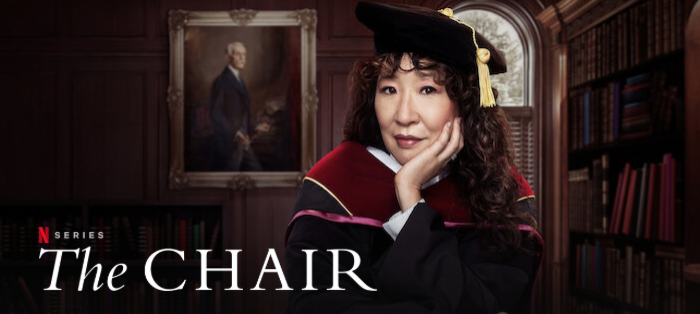Review: ‘The Chair’ is everything modern-day academia needs to hear
Screenshot of “The Chair” via Netflix
In a timeline where streaming platforms seemingly churn out mediocre and outdated content, “The Chair” is a breath of fresh air and a call to action at the same time.
August 25, 2021
Netflix’s new drama series, “The Chair,” highlights exactly what modern-day academia brushes over.
When a woman of color becomes the chair of the failing Pembroke University’s English Department, it is perceived as remarkable and a huge step forward for people of color. But when a white, previously well-respected professor does a Nazi salute during a lecture, the university’s efforts toward inclusivity and representation are meaningless, and rightfully so.
Sandra Oh plays the Chair herself, Ji-Yoon Kim. Oh nails her character’s up and down emotions from being saddled with massive responsibility while also being forced to appear grateful for having the position at all.
It feels like we’re in a timeline where streaming platforms churn out mediocre and outdated content seemingly more often than they deliver relevant and memorable ones. “The Chair” is a breath of fresh air and a call to action at the same time, breaking the pattern of forgettable television.
The six-episode series manages to acknowledge gender and race disparities in academia while keeping it light and humorous. “The Chair” is able to hit a nerve in every age group, providing viewers with a double-dose of comedy and anger on the characters’ behalf. It even touches upon the way universities treat their older staff — brushing their expertise off simply because of their age.
There’s a notable romantic plotline in the series, between Professor Kim and Professor Dobson (Jay Duplass), who makes light of a Nazi salute and causes an uproar among an already crumbling department.
The sexual tension between Kim and Dobson is palpable to the entire department, making Kim appear untrustworthy and biased. Students of color, who thought they could trust her to right Dobson’s wrong, especially felt this sentiment.
“The Chair” highlights the relationships between culture, racism, classism and sexism, all of which take place in just about every university, and often feel swept under a rug.
When Dobson decides to formally apologize to all the students who took action against his insensitive and toxic behavior, it sparks a relevant conversation about apologies and taking responsibility. That is, finally acknowledging that an apology beginning with “I’m sorry for how my actions made you feel” is, in fact, not an apology, but an excuse.
Modern-day academia has seen these issues come to light more than ever before. They’re also up against a much more empowered generation of students. With the police violence committed against Black people, hate crimes committed against the AAPI community and the violence against women globally, our generation has no choice but to fight back.
Furthermore, the outdated yet overwhelming amount of white men in positions of power everywhere, but almost especially in higher education, seems like it will be that way forever.
Like Oh’s character, people of color who hold positions of power deserve recognition for the hardships and challenges they faced getting there. But there’s a clear difference between appropriate recognition and the recognition that occurs as a selfish performance, like when universities plaster their single minority student on the cover of recruiting pamphlets.
There is a striking moment of solidarity between Professor Kim and Professor McKay (Nana Mensah), who is the only Black woman in the department’s staff, and the first in the university’s history to be up for tenure.
Kim grapples with the reality that she is the first woman to chair the department, and McKay grapples with the reality that she will be the first Black woman to be tenured at this prestigious university. The absurdity of this truth in the 21st century brings these two women of color together in a memorable TV moment.
While the series certainly pulls through on the comedic side, the urgency and the importance of the show’s message defies the constraints of a comedy-drama genre.
Boasting diversity among a student body means absolutely nothing when the majority of the staff is white. Celebrating women and people of color in their promotions is a double-edged sword of glee and despair — how far we’ve come versus how far we need to go.
The series’ characters are amazingly cast and play their roles better than I expected from a Netflix original series. Filmed in Pittsburgh, the gray skies and snow covered benches are incredibly familiar. The digs at the Title IX office feel appropriate, and it gives me hope to think that the show’s intimate look at what college culture looks like today will reach the right people. That is, the people who choose to ignore it instead of address it.
Academia is failing at inclusivity, equality and taking responsibility. The fear of cancel culture and losing money has trumped students’ needs for far too long. “The Chair” is a perfect, lighthearted poke on college administrations’ shoulders to get up and do something.
It’s time that students, educators, parents and administrators take a page from “The Chair’s” book, and start fighting against the oppression of modern-day academia.








